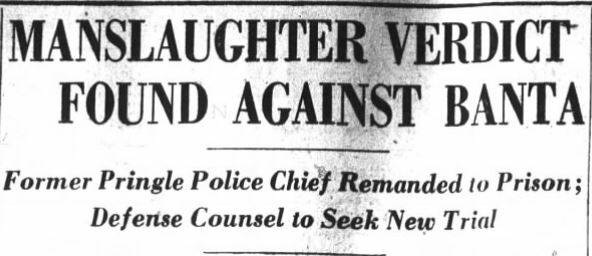Was a blameless man found guilty of killing his wife after a Luzerne County jury trial in March 1931?
The Pringle Police Chief, Elmer J. Banta, 34, entered his home at 2 Cooper St. on Dec. 25, 1930. Banta went into his bedroom and took his revolver from its holster. He then placed the revolver on a dresser, causing it to go off and hit his wife Valaria (also known as Alice), 27, in the abdomen.
Before Valaria Banta passed away at Mercy Hospital in Wilkes-Barre on Dec. 27, 1930, she stated that the shooting was accidental.
Even though two county detectives and a room full of family members heard her statement, Chief Banta was arrested for murder and taken before Luzerne County Judge John S. Fine, who released him on $5,000 bail.
Detectives believed the revolver was of “inexpensive foreign make” as the hammer was damaged when it hit against a dresser leg, as reported in the Wilkes-Barre Record on Dec. 29, 1930.
Detectives continued to investigate and found that Valaria Banta was upset because her police chief husband had not come home on time to take her to midnight Christmas mass. When Elmer Banta finally came home, Valaria Banta scolded him for being late.
The argument about missing midnight mass was a motive that led to Elmer Banta being accused of murder and his case being brought before a Luzerne County grand jury on March 5, 1931.
The grand jury decided to keep the murder charge against Elmer Banta.
Elmer Banta’s trial started on March 23, 1931, at the courthouse before Judge W. Alfred Valentine.
Assistant District Attorney Roscoe B. Smith argued that the shooting was deliberate, as it occurred during an argument about missing midnight Christmas mass, and sought a first-degree murder conviction. Elmer Banta’s lawyers, Lewis R. Crisman and James McQuade, told the jury that the shooting was accidental and at worst, Valaria Banta’s death was the result of carelessly handling a revolver.
Valaria Banta’s sister, Helen Sangalo, who lived in the other half of the double block house, stated that they had planned to attend midnight mass together as a family, but Elmer Banta had not come home on time, as reported by the Wilkes-Barre Record on March 24, 1931.
Sangalo said that when Elmer Banta did arrive home, she heard “angry loud words followed by a shot,” according to the Record.
Sangalo ran next door and saw Elmer Banta standing in his police uniform while Valaria Banta was lying on the floor.
Elmer Banta gave a testimony in his own defense. He told the jury that once he realized his wife had been shot, he found a telephone book and called a doctor.
The jury was given the case at 5:30 p.m. on March 25, 1931. Before they began deliberating due to the hour, they were escorted by deputy sheriffs to a hotel for dinner. After dinner, the jury was taken to the courthouse sub-basement to deliberate until 1:30 a.m. on March 26, 1931.
At 2:45 p.m. on March 26, 1931, the jury foreman read the verdict: Guilty of voluntary manslaughter.
“The verdict surprised the defendant, who had expected to be found not guilty based on his assertion that the shooting was accidental,” the Record reported on March 27, 1931.
Even before the decision was made public, Elmer Banta’s co-defense lawyer, McQuade, notified that they will appeal.
“Yes, it is unfortunate for an innocent person to be sent to prison and I am innocent,” said Elmer Banta to reporters as he was transferred from the courthouse to the county jail.
Judge Valentine gave Elmer Banta a sentence on March 30, 1931, of five to 12 years in Eastern Penitentiary in Philadelphia, and suggested that he be kept in solitary confinement because of his previous job as a police officer.



